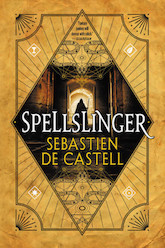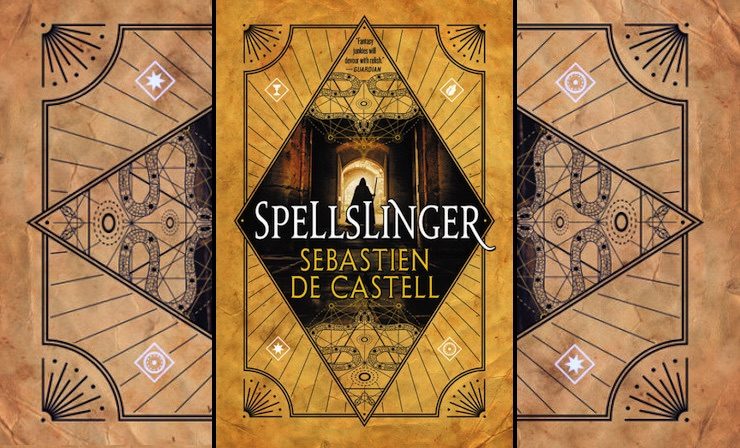Sebastien de Castell’s first fantasy series, the Greatcoats (Traitor’s Blade, Knight’s Shadow, Saint’s Blood, and Tyrant’s Throne) was well-received. Unaccountably, I don’t seem to have read them already, and Spellslinger—the opening volume in a new series—makes me suspect that I’ve been missing out.
Spellslinger was first published in hardcover in 2017 by UK outfit Hot Key Books, along with sequel Shadowblack. The third novel, Charmcaster, came out earlier this year, and a further volume is scheduled to appear in the autumn. Now Orbit Books is releasing a paperback edition of Spellslinger, with sequels soon to follow.
Buy the Book


Spellslinger
Spellslinger features a main character who’s just about to turn sixteen. Kellen is a young man in a society ruled by magic. His parents are among the most powerful mages of their generation, and his younger sister bids fair to be just as strong. But Kellen’s magic is barely strong enough to light a candle, and if he doesn’t figure out how to pass his mage trials in the few days before his sixteenth birthday, he’ll be reduced from having the status of a Jan’tep mage to Sha’tep—a servant, probably cleaning floors and cooking meals in the house where he was once a favoured son.
When he tries to win a mage duel by trickery, and thus pass the first of his trials, things go a bit wrong for Kellen. His little sister ruins his attempt, and he ends up nearly dying. If it weren’t for the intervention of Argosi wanderer Ferius Parfax, he’d be dead.
The Argosi are travellers and gamblers, living by their wits and their decks of cards. Parfax is sarcastic, insouciant, hard-drinking, unpredictable and worldly. She’s also the reason that Kellen is summoned to visit the Dowager Magus—the three-hundred-year-old widow of the man who essentially created Jan’tep society. The Argosi travel to places where they think people or events that have the potential to change the world occur. The dowager wants to know why Parfax has shown up there.
Kellen’s drawn to Parfax of his own accord, but he’s willing to play the dowager’s game as well. Parfax, though, challenges him to act in accordance with his conscience, and to look at the hypocrisy of his society—by pricking at his pride. Unfortunately for Kellen, acting in accordance with his conscience isn’t going to get him past his mage trials. It does mean he stumbles into politics and over secrets, and has to face some uncomfortable truths. Jan’tep society is based on a genocidal lie, and it really doesn’t give the Sha’tep any reason to want to support it. And Kellen’s parents have been deceiving him for his whole life.
This is a novel that’s likely to appeal to both young adult and traditional adult fantasy audiences. Kellen’s a young man coming towards adulthood, beginning the process of figuring out how he fits in the world. These are classic elements in both genres.
But let’s talk about Spellslinger’s flaws for a moment. It falls hard into the old pit of laughable fantasy names: the apostrophes are entirely over-the-top and make no real sense at all. It’s ap’stro’e time! Classic, right? For me, largely annoying.
And I have a problem with de Castell’s choice in Spellslinger—which is also the choice of many creators—not to explicitly include queer people and queer relationships. Heterosexual relationships (between Kellen’s parents, and between Kellen and a young woman whom he likes a lot) are explicitly affirmed as a possibility for this world, but queer ones are not affirmed in the same way. It is also noticeable that nearly all the incidental background characters—the Sha’tep servants, the mage teachers, Kellen’s personal rivals and his family’s enemies—are men, rather than a mix of men and women.
That said, Spellslinger has a great voice, good pacing, and a very funny intelligent squirrel-cat that keeps threatening to eat people’s eyes. I approve of the squirrel-cat, but I remain disappointed that the novel is not nearly as satisfying to me as it could be if it were a little more thoughtful about inclusion.
Spellslinger is available from Orbit.
Liz Bourke is a cranky queer person who reads books. She holds a Ph.D in Classics from Trinity College, Dublin. Her first book, Sleeping With Monsters, a collection of reviews and criticism, was published in 2017 by Aqueduct Press. It was a finalist for the 2018 Locus Awards and is nominated for a Hugo Award in Best Related Work. Find her at her blog, where she’s been known to talk about even more books thanks to her Patreon supporters. Or find her at her Twitter. She supports the work of the Irish Refugee Council, TENI , and the Abortion Rights Campaign.










